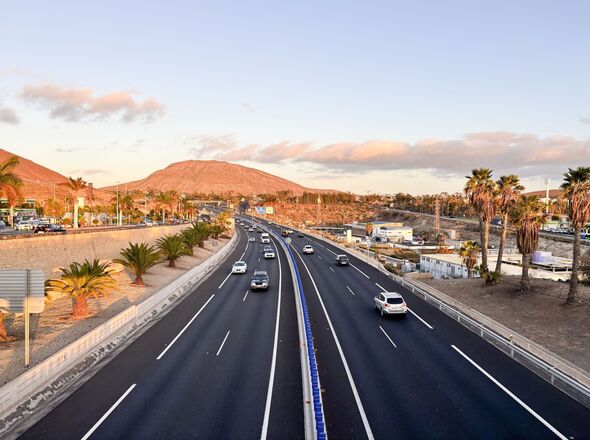A Tenerife motorway will be expanded in a £1.3 billion project in an attempt to end the traffic chaos.
First announced in June 2022, the Spanish government gave the Canary Islands a budget of 1.6 billion euros – or £1.3 billion – to improve Tenerife’s roads and construct a third lane in both directions. Construction is aimed at increasing the capacity of the island’s traffic as well as improving safety.
The TF-1, or the Autopista del Sur, was first constructed in the 1970s, with the roadway being doubled in the late 1980s. In 2009, a section from Santa Cruz to Güímar was upgraded to have a third lane.
The 64-mile motorway encircles the eastern and southern parts of Tenerife, running from the capital of Santa Cruz in the north to Adeje, with its major tourist resorts of Los Cristianos and de Las Américas in the south and Santiago del Teide in the west. It is the longest motorway in the archipelago.
As of 2022, 50,000 vehicles used the section – between Santa Cruz and Playa de Las Américas – most heading south between 7.30 and 9 am and 3.30 and 5pm.
With 6.5 million tourists flooding the island annually, the island’s infrastructure is stretched to its limits.
It appears that a great many Tenerife residents are anti-infrastructure expansion and pro-limiting the number of tourists. Speaking to Express.co.uk, Brian Harrison, spokesman of the Spanish protest group Salvar La Tejita said: “These works tend to go on for years and years and make the problem worse. Once they open the third lane, it might ease traffic but that is not the problem.
“The problem is that every single year there are more cars on the road. So by the time the work is finished, it will be obsolete because there will be even more cars in need of a fourth and a fifth lane.”
He said, instead, what is needed is a “substantial increase” of and improvement to the public transport system which he described as “absolutely abysmal”.
The solution, he argued, is “to take cars off the road”. Mr Harrison suggested the implementation of a “vehicle tax, maybe five euros a day per vehicle”, with the funds being invested into upgrades to this “non-existent” public transport system.
He raised concerns over the Canary Island Government’s lack of interest in the issue and stated that “if you are not going to stem the excess tourism and mass tourism, then we are going to do it for you”.
Previously in April, Mr Harrison told Express.co.uk that “There are over half a million vehicles registered on the island. The 3 motorways on the island are deadlocked on a daily basis due to the unsustainable increase of rental vehicles circulating”.
A staggering 13.9 million tourists visited the Canary Islands in 2023, 13 percent more than the previous year, according to local chamber of commerce figures. That is about six times more than the islands’ population of 2.2 million, said the BBC.
Among Mr Harrisons other concerns was the fact that the archipelago has the highest rate of poverty in Spain, at 36 percent, as well as the housing and environmental crisis as a result of mass tourism. Mr Harrison highlighted sewage contamination of the ocean, with over 50 million litres of sewage pouring into the sea annually, posing serious health risks to both residents and tourists alike.
On Monday, the Tenerife Cabildo – the island council – announced diversions on TF-65 road in Las Chafiras due to the first phase of construction of the third lane, affecting the section between San Isidro and Las Américas, including the new Oroteanda to Las Chafiras junction.
The changes are necessary in order to carry out initial earthworks for new access ramps leading to Chafiras overpass, according to the Department of Roads. Construction is expected to take two weeks.
In April 2024, activists on the island began a hunger strike in protest at what they saw as a destructive growth of tourism on the Canary Islands. They called for the halt to the construction of a hotel and beach resort in the south of the island, as well as a moratorium on all tourism development projects.
